For years, Zendesk Sell has been Zendesk’s dedicated sales CRM. But come August 31, 2027, Zendesk will be closing the chapter on it.
Yes, the tool is officially being retired.
If you are a Zendesk Sell user, on paper, that gives you a couple of years to figure things out and move on. But in reality, CRM transitions can take time. Between migrating customer data, retraining your sales team, and making sure your tech stack still runs smoothly, the clock is already ticking.
And if you were just about to choose Zendesk Sell as your new sales CRM? Well, this changes things for you too. You don’t want to invest time and money into a platform that’s nearing the end of its road.
That’s why we’ve put this guide together, showcasing the best Zendesk Sell alternatives that are here to stay.
We’ll walk you through each tool, comparing their strengths, use cases, and where each shine.
Among them, you’ll also see how LeadSquared stacks up as a viable sales CRM replacement to Sell, designed to help teams scale efficiently and adapt as their needs grow.
Why You Need to Look for a Zendesk Sell Alternative Now
Zendesk Sell won’t officially be retired until August 2027, which might feel comfortably far away. But as we touched on, the longer you wait, the more pressure you’ll put on your team when the deadline arrives.
The risks of waiting too long
1. Data migration headaches
Moving years of customer and sales data isn’t something you want to rush. Leaving it to the last minute can lead to errors, lost records, or a chaotic handoff.
2. Retraining under pressure
Your sales team already has quotas and targets to hit. Asking them to learn a new CRM in a hurry could tank productivity when you can least afford it.
3. Integration breakdowns
CRMs rarely work in isolation. If Zendesk Sell is powering email syncs, dialers, or custom workflows, those connections need time to be rebuilt elsewhere.
The upside of starting early
On the flip side, beginning your search now gives you options. You can:
1. Transition smoothly
Plan your migration in phases, test integrations, and move data safely.
2. Get better support
Early movers get more personalized support from alternative CRM vendors. The closer 2027 gets, the busier those providers will become.
3. Opportunity to modernize workflows
Migration isn’t just about moving data. Starting early gives you time to rethink and improve your old workflows.
4. Adopt new features gradually
Switching early also means your team can get comfortable with the new tool.
In short, the smart move is to start exploring Zendesk Sell alternatives now.
What to Look for in a Zendesk Sell Alternative
Before we dive into the list of alternatives, let’s set the stage. Not every CRM will be the right fit, and the last thing you want is to jump into a new system only to realize it doesn’t solve your long-term needs. Here are the main criteria worth paying attention to when evaluating a replacement for Zendesk Sell:
1. Ease of migration
Moving customer data, pipelines, and activity history shouldn’t feel like pulling teeth. Look for a CRM that offers straightforward import/export tools and, ideally, vendor-assisted migration support. A smooth start can make all the difference.
2. Familiar workflows and features
Your sales team is already used to certain ways of working—like pipeline management, activity tracking, and reporting. Choosing a CRM with similar workflows minimizes the learning curve and keeps productivity steady.
3. Strong integrations
Zendesk Sell users often rely on email syncs, phone dialers, marketing automation tools, and APIs. Any new CRM should plug into your existing ecosystem just as easily, or better.
4. Scalability
It’s not just about replacing Zendesk Sell for today. The CRM should also scale with your business needs of tomorrow, whether that means handling larger lead volumes or adapting to more complex reporting needs over time.
5. Pricing and ROI
The dollars have to make sense. The ideal alternative should be affordable without forcing compromises on core functionality. Consider how much return on investment you’ll get from the features offered.
6. Availability of a service tool
Since Zendesk’s strength has long been its customer support suite, many Sell users are also accustomed to pairing sales with service. When considering alternatives, it’s worth checking if the CRM vendor also offers a built-in service tool — ensuring sales and support teams can work in sync.
Lay out these criteria upfront to be better equipped to know which CRMs truly fit your needs.
Top Zendesk Sell Alternatives in 2025
| Zendesk Sell Alternatives | Popular for | Average Rating | Pricing |
| LeadSquared | AI-lead scoring, robust automation, unified sales-marketing-service ecosystem, mobile CRM | 4.5 | Sales Pro – $60/user/month Sales Super – $100/user/month |
| HubSpot Sales Hub | User-friendly onboarding, marketing + service integrations, ecosystem & integrations | 4.4 | Sales Hub Professional – $90/user/month Sales Hub Enterprise – $150/user/month |
| Emitrr | Emitrr is popular as a comprehensive communication and customer-engagement platform, especially for local and service-based businesses. Here are some of their standout features. | 4.1 | Standard Plan – $20/user/month Professional Plan – $35/user/month |
| Pipedrive | Pipeline visibility, affordability for smaller teams, simplicity | 4.3 | Essential – $14/user/month Advanced – $39/user/month Professional – $49/user/month Enterprise – $79/user/month |
| Zoho CRM | Feature richness, large app ecosystem, automation + customization | 4.1 | Standard – $14/user/month Professional – $23/user/month Enterprise – $40/user/month Ultimate – $52/user/month |
| Salesforce Sales Cloud | Enterprise-scale customization, AI insights, advanced reporting | 4.4 | Essentials – $25/user/month Professional – $100/user/month Enterprise – $175/user/month Unlimited – $300/user/month Agentforce 1 Sales – $550/user/month |
| Freshsales | User-friendly interface, multichannel engagement, built-in communication tools | 4.5 | Free: $0/month for up to 3 users Growth – $15/user/month Pro – $49/user/month Pro + AI Copilot – $78/user/month Enterprise – $79/user/month |
| Copper CRM | Deep Google Workspace integration, ease of use for Gmail/Calendar users, Built-in task automation | 4.5 | Starter –$12/user/month Basic – $29/user/month Professional – $69/user/month Business – $134/user/month |
1. LeadSquared
LeadSquared takes the heavy lifting out of sales with an AI-powered CRM that ties sales, marketing, and service into a single platform. It’s designed for businesses that want to grow quickly while keeping their processes smooth and simple.
Pros
- Automatically prioritizes leads based on their likelihood to convert (with AI-powered lead propensity), helping sales teams focus on high-potential opportunities.
- Captures and manages leads from multiple channels, including websites, advertisements, messaging platforms, social media, phone calls, field events, and more.
- Mobile CRM app allows your team to stay productive from anywhere.
- Customizable dashboards help track KPIs and gain actionable insights.
- Integrates with a variety of third-party applications to expand CRM capabilities.
- Automates repetitive tasks so sales teams can focus on strategic activities.
- Lexi, LeadSquared’s AI assistant, guides sales reps with smart nudges, call sentiment analysis, and tailored talking points, making every interaction more effective.
- Effortless integration with LeadSquared’s Marketing Automation, Communication, and Service modules creates a unified ecosystem, reducing silos across customer touchpoints.
- Highly rated customer support ensures smooth onboarding, fast resolutions, and ongoing guidance.
Cons
- Has a learning curve due to its extensive feature set.
- Pricing might be higher for smaller teams.
Pricing
- Sales Pro: $60 per user/month
- Sales Super: $100 per user/month
2. HubSpot Sales Hub
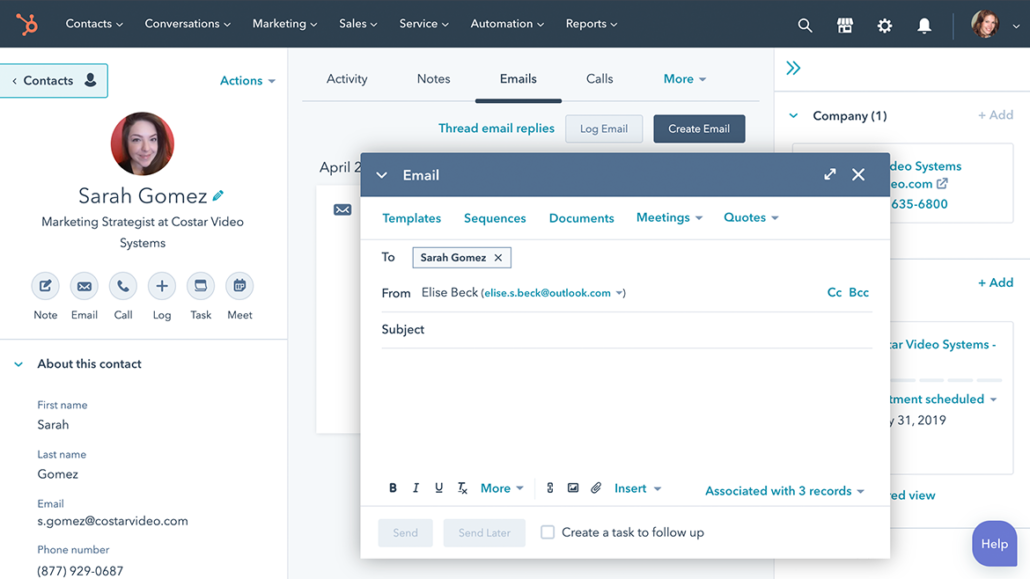
HubSpot Sales Hub is a popular CRM that helps businesses keep their sales process organized and easy to manage. With tools for tracking pipelines, automating routine tasks, and staying connected with customers, it’s built for teams that want efficiency without a steep learning curve.
Pros
- User-friendly interface that simplifies onboarding and daily operations.
- Robust automation features, including email sequences and task workflows, to streamline sales processes.
- Advanced reporting and analytics capabilities to track sales performance and forecast revenue.
- Seamless integration with HubSpot’s Marketing and Service Hubs, providing a unified view of customer interactions.
- Extensive marketplace with over 300 integrations to connect with various third-party applications.
- Strong customer support with a vast knowledge base and dedicated assistance.
Cons
- Higher-tier plans can be expensive, especially for small teams.
- Some advanced features are only available in higher-tier plans.
- Customization options may be limited compared to more complex CRMs.
Pricing
- Sales Hub Professional – $90/user/month
- Sales Hub Enterprise – $150/user/month
3. Emitrr

Emitrr is an AI-driven sales CRM and customer messaging platform designed to help businesses streamline communication with leads and clients via SMS, voicemail, and chat. It is particularly useful for service-based industries like real estate, home services, and local businesses that rely on timely follow-ups and efficient sales processes. By automating lead nurturing, appointment reminders, follow-ups, and feedback collection, Emitrr enhances customer engagement, improves conversion rates, and reduces manual workload for sales teams.
Pros:
- Emitrr provides 99.99% uptime, ensuring calls, texts, and chats run without interruption.
- The platform’s dashboard is designed to reduce clicks and save time, allowing teams to manage conversations more efficiently.
- HD-quality voice calls deliver clear, professional interactions with every customer.
- Emitrr integrates seamlessly with CRM, EHR, and practice management systems, keeping customer records and communications in sync.
- Its transparent pricing allows businesses to scale communication without unexpected costs or feature limitations.
- All communication channels—texting, calling, voicemail drops, and review management—are unified in a single platform.
- Appointment reminders, missed call follow-ups, and customer outreach can be automated, reducing manual workload for teams.
- Flexible call trees, queue groups, and user-specific schedules can be configured to match a business’s operational needs.
- Emitrr can turn existing business phone numbers into text-enabled lines, allowing customers to text landlines seamlessly.
Cons:
- Some features are still under development and will be rolled out soon.
Pricing:
- Standard Plan – $20/user/month
- Professional Plan – $35/user/month
4. Pipedrive
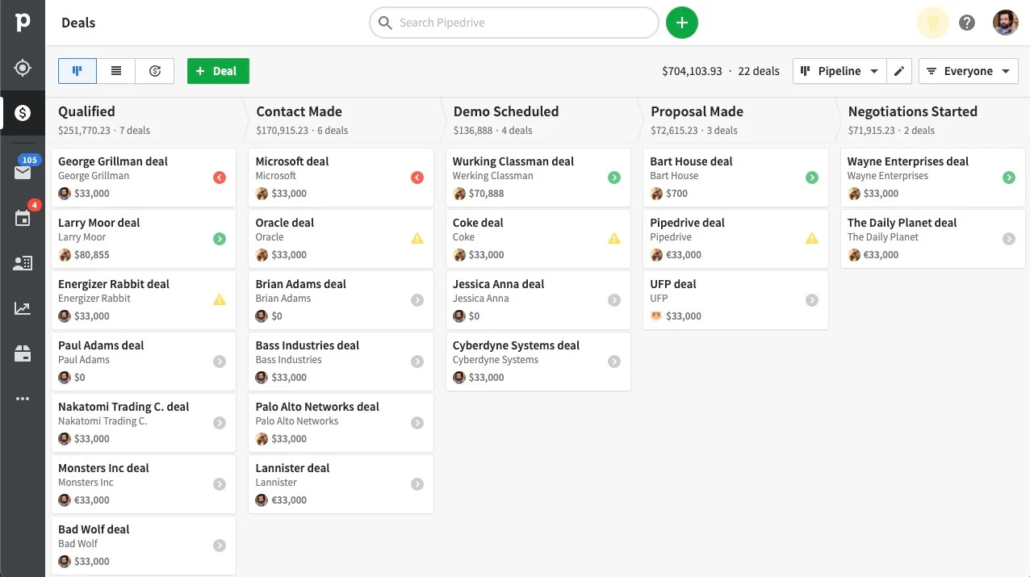
Pipedrive is a CRM that puts pipeline management front and center. With its intuitive design and productivity-focused features, it helps sales teams stay efficient and move deals forward with less effort.
Pros
- User-friendly interface that simplifies onboarding and daily operations.
- Visual sales pipeline that offers a clear overview of deals and their respective stages.
- Robust automation features, including email sequences and task workflows, to streamline sales processes.
- Advanced reporting and analytics capabilities to track sales performance and forecast revenue.
- Extensive marketplace with over 500 integrations to connect with various third-party applications.
- Strong customer support with 24/7 chat and email access, with live and phone support varying by plan.
Cons
- Higher-tier plans can be expensive, especially for small teams.
- Customization options may be limited compared to more complex CRMs.
- Some advanced features are only available in higher-tier plans.
Pricing
- Essential – $14/user/month
- Advanced – $39/user/month
- Professional – $49/user/month
- Enterprise – $79/user/month
5. Zoho CRM
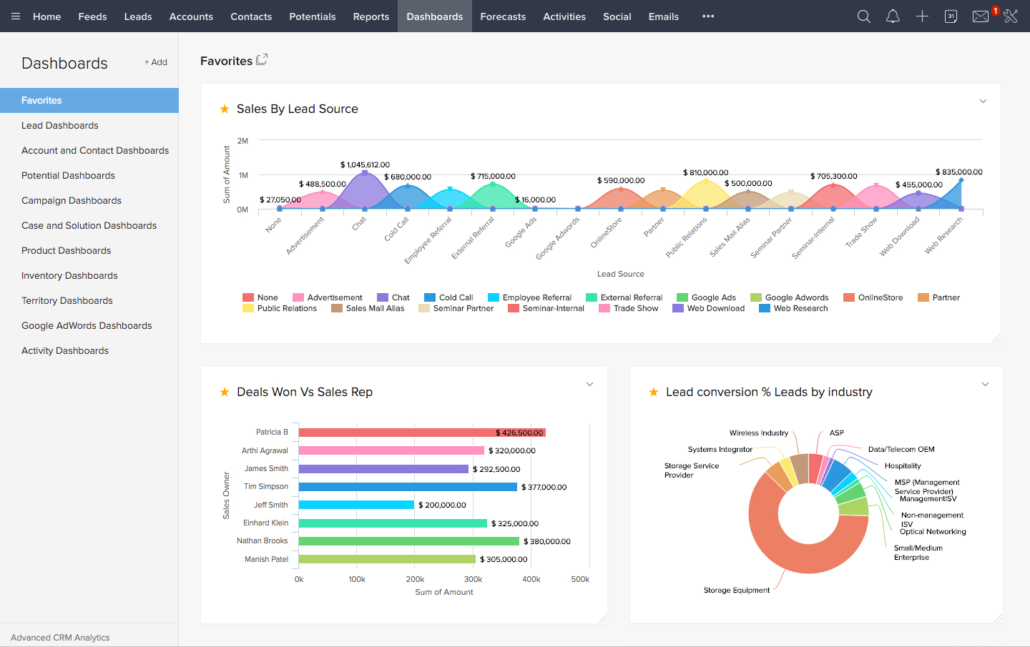
Zoho CRM is a well-rounded tool designed to manage sales, marketing, and service in one platform. Its strength lies in automation and customization, making it a practical choice for small and mid-sized businesses looking for scalability.
Pros
- Offers a free plan for up to 3 users, perfect for small teams or startups.
- Provides automation tools to simplify everyday sales tasks.
- Highly customizable, letting you tweak modules and fields to match your process.
- Integrates with over 600 apps, including Google Workspace and Microsoft 365.
- Features an AI assistant, Zia, for smart insights and predictions.
- User-friendly interface that’s easy for teams to pick up quickly.
Cons
- Advanced features only available in higher-tier plans.
- Customization may require some technical know-how.
- Mobile app could be made more intuitive.
Pricing
- Standard – $14/user/month
- Professional – $23/user/month
- Enterprise – $40/user/month
- Ultimate – $52/user/month
6. Salesforce Sales Cloud
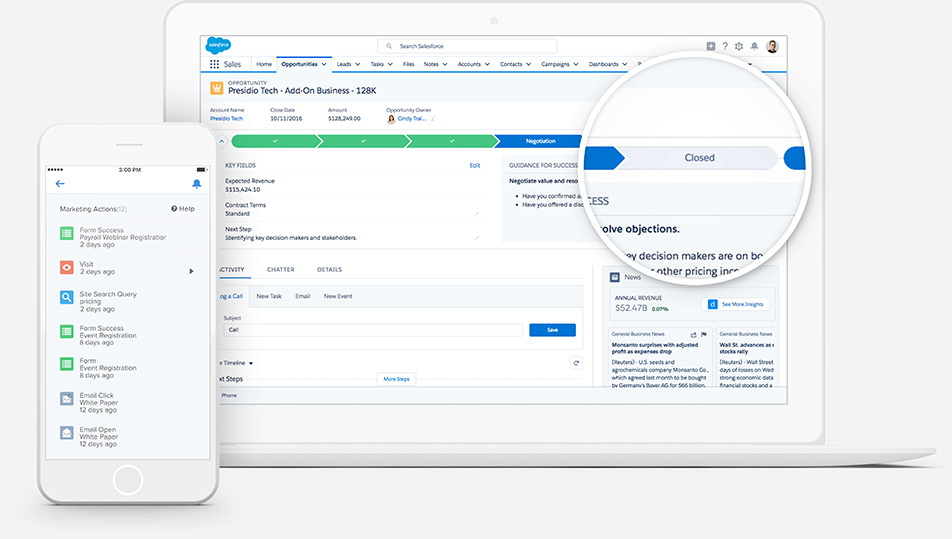
Salesforce Sales Cloud offers a full suite of CRM tools for managing sales pipelines and customer relationships. From lead tracking to AI-driven insights, it’s built for businesses that want a complete, customizable system to support growth.
Pros
- Comprehensive suite of tools for lead and opportunity management.
- Built-in AI features, including Einstein AI, for predictive analytics and insights.
- Customizable dashboards and reports to track sales performance.
- Seamless integration with other Salesforce products and third-party applications.
- Mobile-friendly interface for sales teams on the go.
- Robust support and training resources available.
Cons
- Pricing can be on the higher side.
- The platform’s complexity translates to a large learning curve.
- Customization options require technical expertise.
Pricing
- Essentials – $25/user/month
- Professional – $100/user/month
- Enterprise – $175/user/month
- Unlimited – $300/user/month
- Agentforce 1 Sales – $550/user/month
7. Freshsales
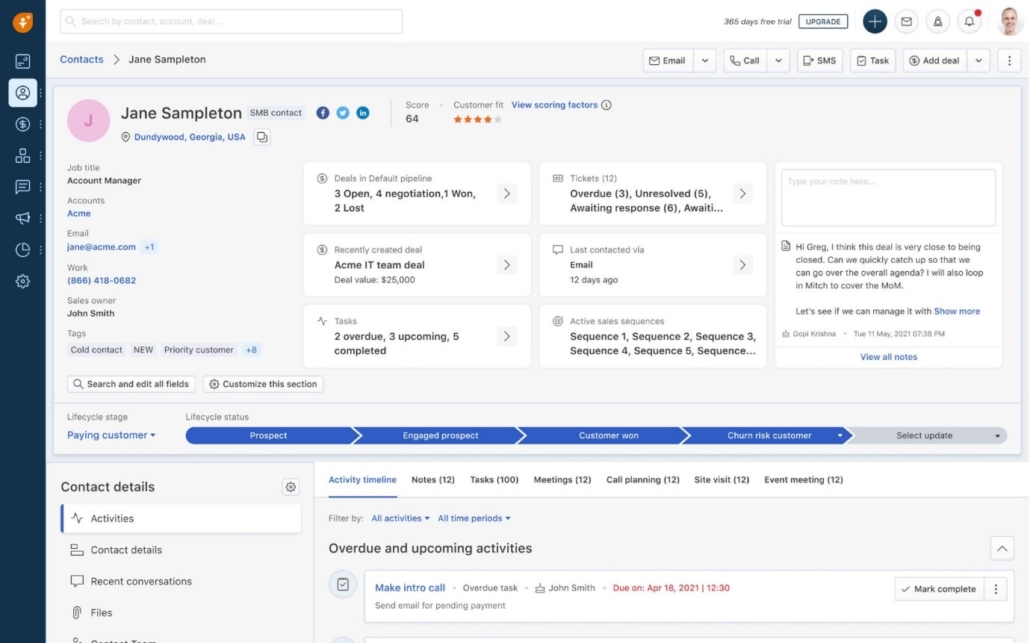
Freshsales is a CRM that keeps things easy for fast-moving sales teams. It brings leads, deals, and tasks into one place, with built-in phone, email, and chat to keep conversations flowing.
Pros
- User-friendly interface with minimal learning curve.
- Built-in communication tools: phone, email, and chat.
- AI-powered insights and lead scoring.
- Customizable sales pipelines and workflows.
- Robust reporting and analytics features.
- Seamless integration with other Freshworks products.
Cons
- Advanced features available only in higher-tier plans.
- Customization options may require technical expertise.
- Some users report that the mobile app could be more intuitive.
Pricing
- Free: $0/month for up to 3 users
- Growth – $15/user/month
- Pro – $49/user/month
- Pro + AI Copilot – $78/user/month
- Enterprise – $79/user/month
8. Copper CRM
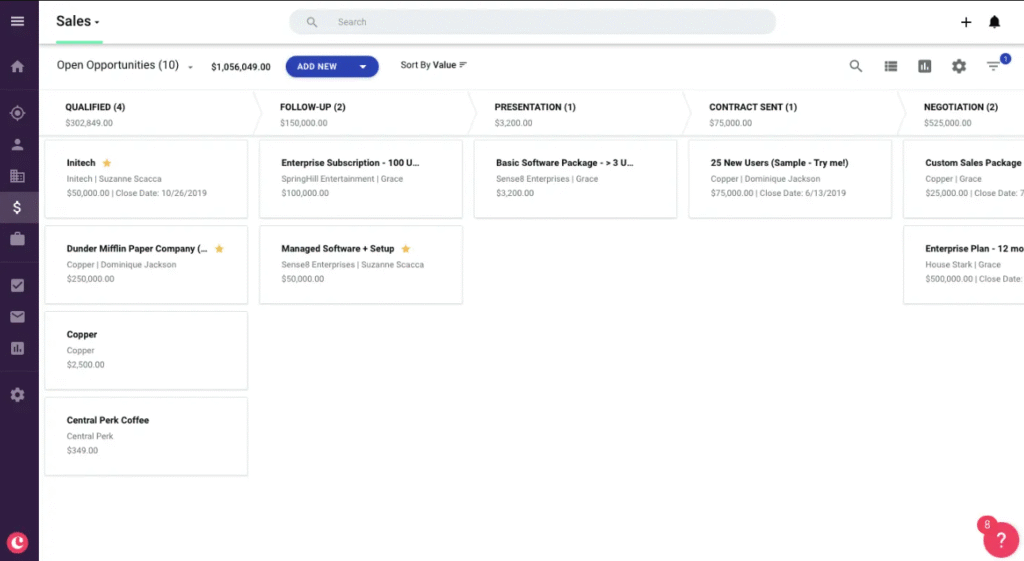
If your team runs on Google Workspace, Copper CRM feels like a natural extension. It pulls in your emails, meetings, and files directly into the CRM, making it easier to stay on top of deals. Add in pipelines, task automation, and reporting, and you’ve got a streamlined way to manage sales.
Pros
- Seamless integration with Google Workspace, providing a familiar interface for users.
- Customizable pipelines and workflows to match specific business processes.
- Built-in task automation to reduce manual data entry and improve efficiency.
- Robust reporting and analytics tools for data-driven decision-making.
- Strong support for team collaboration and communication within the platform.
- Mobile application available for managing CRM activities on the go.
Cons
- Learning curve associated with advanced features and customization options.
- Limited native integrations outside of the Google ecosystem.
Pricing
- Starter – $12/user/month
- Basic – $29/user/month
- Professional – $69/user/month
- Business – $134/user/month
Why LeadSquared is a Strong Alternative to Zendesk Sell
If you’re exploring Zendesk Sell alternatives that blend efficiency with user-friendliness, LeadSquared deserves your attention.
1. Feature-rich sales CRM
LeadSquared offers a comprehensive suite of tools to take your sales operations to levels beyond. Beyond advanced lead management, automation, and mobile CRM, it now comes with AI-powered capabilities as well.
For instance, you get conversion propensity predictions, opportunity nudges to revive stalled deals, and AI insights that give a unified view of potential wins. Your sales reps also benefit from guided selling recommendations, AI-assisted sales pitch suggestions, and call sentiment analysis, to make the best out of every interaction. For field teams, features like an AI day planner, nearby opportunity alerts, and daily wrap-ups help reps stay focused and efficient. Plus, AI-driven performance tracking, goal setting, and coaching insights support continuous improvement across the team.
2. Smooth migration & onboarding
Transitioning to a new CRM can be daunting, but LeadSquared aims to make it as seamless as possible. With intuitive data import/export tools and dedicated support, the onboarding process is straightforward, ensuring your team can hit the ground running.
3. Scalability
Whether you’re a small business or a growing enterprise, LeadSquared’s sales CRM scales with you. Its flexible architecture ensures that as your needs evolve, the platform can adapt as well.
4. Strong integrations
Integrating with various marketing, communication, and productivity tools is crucial for a cohesive workflow. LeadSquared supports a wide range of integrations, allowing you to connect your CRM with the tools you already use.
5. Competitive pricing
LeadSquared’s Sales CRM pricing is built to deliver value right from the start. With plans beginning at $60/user/month (Sales Pro), you get essentials like lead management, pipeline tracking, automation, mobile CRM, reporting, and integrations included — features that many CRMs only unlock at higher tiers.
Rather than competing on being the cheapest seat rate, LeadSquared focuses on reducing total cost of ownership by including automation, mobile CRM, integrations and support in the package. That approach keeps ongoing add-on and integration costs lower for many customers, so the platform often delivers stronger value even if the headline seat price sits above some of the regular CRMs.
For teams that want more, the Sales Super tier layers in advanced capabilities without forcing you into a maze of add-ons. And while sales is the core, LeadSquared also offers integrated Marketing and Service clouds, so businesses can connect customer acquisition, engagement, and support within a single ecosystem when needed.
Compared to Zendesk Sell, which often required tier jumps to unlock automation or customization, LeadSquared keeps costs predictable and ensures that what you’re paying for translates into real functionality and long-term scalability.
Conclusion
With Zendesk Sell officially heading toward retirement, the clock is ticking. Whether you’re already using the tool or were considering it as your next CRM, it’s a smart move to start exploring alternatives now. Switching early means fewer headaches and more time for your team to adapt.
The good news is, you’re not short on choices. From simple, pipeline-focused tools like Pipedrive to enterprise giants like Salesforce, solutions are available for every type and stage of business.
And if you’re looking for a CRM that balances power with usability — while making migration as smooth as possible — LeadSquared is a strong fit for former Zendesk Sell users. Beyond sales, it also comes with built-in marketing automation and customer service tools, so you can manage the entire customer journey on one platform rather than stitching together multiple systems.
At the end of the day, the “best alternative” is the one that fits your specific needs. If you’d like to see how closely LeadSquared’s offerings align with your business goals, feel free to book a quick demo.
FAQs
When will Zendesk Sell be retired?
Zendesk Sell will officially be retired on August 31, 2027. Until then, current customers will have full access and support, but Zendesk will no longer invest in new features for the product.
Can new customers still sign up for Zendesk Sell?
Zendesk has announced Sell’s retirement, but their support articles don’t explicitly state whether new sign-ups are blocked today. Even if sign-ups are technically possible, it may not be a wise choice to invest in a platform scheduled to shut down in 2027.
What should I consider when migrating from Zendesk Sell to another CRM?
The most important factors are data migration, user training, and integration testing. Some data types, like call logs, emails, and appointment history, may not export perfectly, so planning ahead is crucial to avoid losing valuable information.
Which CRM is most similar to Zendesk Sell?
If you liked Zendesk Sell for its pipeline-focused simplicity, CRMs like LeadSquared and Pipedrive provide a similar experience with straightforward workflows and strong sales automation.
Do Zendesk Sell alternatives integrate with email, phone, and marketing tools?
Yes. Most modern CRMs, including LeadSquared, HubSpot, Zoho, and Salesforce, integrate with email platforms, phone systems, and marketing automation tools. Many also provide APIs and app marketplaces for deeper connections.
How much does it cost to switch from Zendesk Sell to another CRM?
Costs vary widely depending on the platform and features. Budget-friendly options like Zoho CRM start at around $14/user/month, while enterprise solutions like Salesforce can exceed $150/user/month. LeadSquared positions itself in the middle — offering competitive pricing with advanced automation and AI features.








